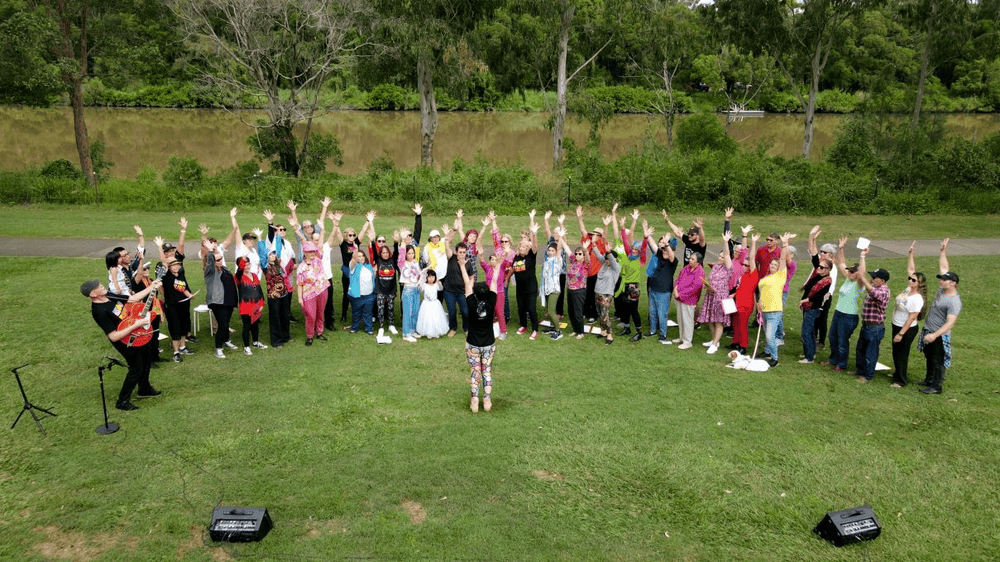For the second year in a row, choirs and singing groups from around the country raised their voices in support of National Reconciliation Week.

In classrooms, halls, churches, and workplaces across Australia, nearly 500 choirs came together in May 2024 to raise their collective voices for this year’s Voices for Reconciliation: Louder Than Ever project as part of National Reconciliation Week. Taking on the anthemic rock classic Blackfella/Whitefella by Warumpi Band, thousands sang in support of both observing the week and the ongoing need for reconciliation in Australia.
It has been almost 40 years since the Warumpi Band first fired up Australia with their single Blackfella/Whitefella. The song is written by band members George Rrurrambu and Neil Murray and calls for people of all backgrounds and races to come together and stand up for change. The power of the song written in 1985 endures in 2024, providing inspiration for action off the back of the Voice to Parliament referendum result.
We, at Reconciliation Australia, did cautiously wonder if thousands of Australians would – once again – come together in song as they did for 2023’s anthem, From Little Things Big Things Grow. However, once 2024’s chosen song was announced, choirs from all corners of the country quickly registered to take part. It soon became obvious just how many people were still ready to fight the good fight for reconciliation.
Queensland musical duo Mundy-Turner and their local Sing for YES campaign group were one of the first groups to answer the call. What happened next was a performance both memorable and impassioned in its quest to keep the conversation about reconciliation and First Nations justice going.
More than 50 people from the local community came together on the Dugulumba Balun (Logan River) to sing loudly and proudly.
‘Singing on Yugambeh Country on the banks of that beautiful Balun felt very potent. We were given an inspiring and informative welcome by Uncle Ted Williams, Yugambeh Elder and Traditional Custodian. The energy was electric!’ says one half of the duo, Cath Mundy.
‘It had enormous significance for our community to come together at this time, to sharpen our commitment to the Uluru Statement from the Heart and to resolve to continue to stand up for Aboriginal and Torres Strait Islander people.’
In its second year, Voices for Reconciliation continued to see dozens of schools taking part. From seasoned school choirs to halls full of all year groups, young Australians were given the chance to learn about reconciliation through song.
Melanie Penny from Geraldton Primary School said the students in the Western Australian school shared the same enthusiasm for the cross-learning moment. ‘National Reconciliation Week is an important part of our learning program at Geraldton Primary School. During choir rehearsals, we watched the Warumpi Band perform Blackfella/Whitefella and discussed the meaning behind the words,’ she said.
Like many of the choirs who took part this year, this was also Geraldton Primary’s second year of being involved.
‘Last year our students were so excited to be included in the Voices for Generations video of From Little Things Big Things Grow. It was an easy and enthusiastic “yes” from our Specialist Choir to learn Blackfella/Whitefella this year,’ said Melanie Penny.
‘We participated with pride, and the achievement was celebrated by parents, teachers, students and our whole wider community when we saw the choir sing in the choral compilation on YouTube and Facebook.’
Joseph Bromley, a teacher at Woodend Primary School in the Macedon Ranges region of Victoria spoke of the power of song in teaching the next generation about Australia’s true history and the need for reconciliation.
‘Communicating, in an age-appropriate manner, the meaning and themes of the song and discussing the message of unity and shared humanity the song expresses was very important. Kids get this stuff. They inherently understand the importance of fairness, justice, and equality something denied the Aboriginal community for far too long.’
Ultimo TAFE also came aboard for a consecutive year, and recorded students and staff performing with their aptly named choir, Ultimate Voices. Educator Cat Coleman said the students enjoyed the process of taking part.
‘Singing in a group is a really wonderful experience for everyone, of all abilities and interests. The students love being a part of an event and having a real purpose to the activity. It is a really positive experience all round.’
Voices for Reconciliation is sure to stay on the events calendar for many years to come, with choirs showing ongoing enthusiasm to keep the beat going.
As Cath Mundy said, ‘When we sing together, we are connected in a joyous way – even about sad and difficult things. We share a common beat, we create unison and harmony, literally and metaphorically. Projects like this create a vital opportunity for understanding and healing to take place.’
Reconciliation Australia thanks the family of the late George Rrurrambu, Neil James Murray, the Butcher families, and Universal Music Publishing Group for their support of Voices for Reconciliation: Louder than Ever.
You can watch all Voices for Reconciliation: Louder Than Ever compilations and performances via youtube.com/ReconciliationAus
This article is from Reconciliation News #52. Read the rest of the issue.



